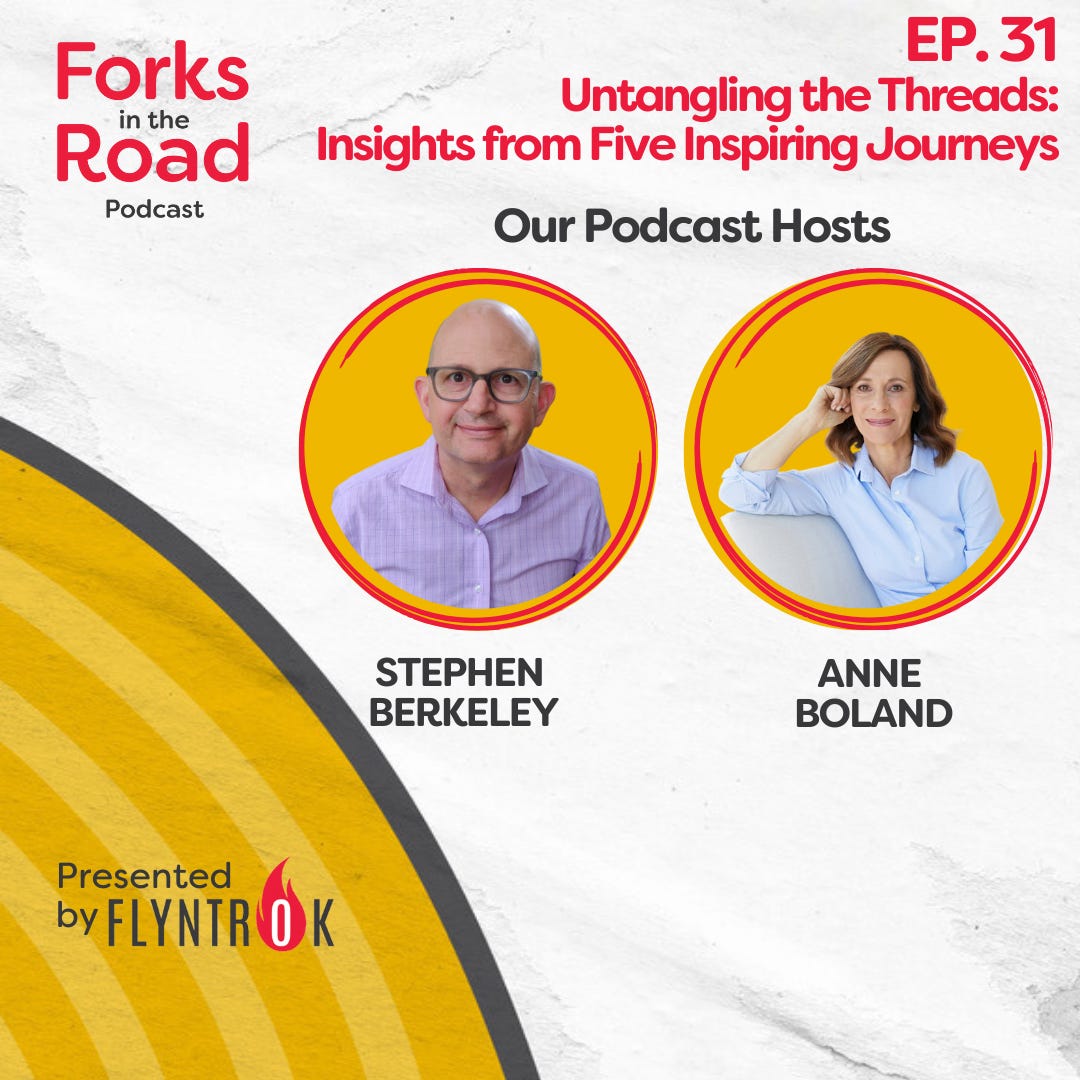In the 31st episode of the Forks in the Road, hosts Stephen Berkeley and Anne Boland reflect on key conversations from episodes 26 to 30. They revisit discussions with remarkable healthcare leaders Dr. Resa E Lewis, Dr. Josephine Elzen Junker, Jarrard O'Brien, Dr. Aditi Joshi, and Dr. Minako Abe, exploring pivotal moments and common themes such as role of reflection and clarity of purpose in navigating their forks in the road, the natural iterative evolution of career paths, the power of adaptability in navigating challenges, and the role of communities in supporting career growth .
What emerges are powerful themes that resonate across diverse lives and careers — like skipping stones, each moment creating ripples that connect our experiences.
Key moments in the podcast:
00:00 Introduction and Episode Recap
00:36 Guest Highlights and Common Themes
02:28 Deep Dive into Guest Experiences
05:31 Career Transitions and Lessons Learned
10:08 Micro Skills and Personal Growth
15:21 Human-Centered Leadership and Community
20:32 Reflections and Final Thoughts
35:23 Conclusion
Here is what stays with us from this conversation:
Deep personal reflection and purpose are essential for navigating life's "Forks in the Road."
A self-reflective approach, like being a "data collector... of oneself as well as about the world," can be a lifelong practice.
Curiosity about making a difference can lead to discovering one's "Ikigai," a Japanese concept for finding purpose.
Career paths are a natural, iterative evolution, building on initial inclinations.
Careers often show a "natural evolution from their initial paths". This progression is like "one seed that is getting refined and developed" through education, application, and experimentation.
This evolution can involve shifts between different specialisations or transitions into academic or management pursuits.
Resilience and adaptability transform challenges into opportunities for growth and confidence.
Resilience involves ignoring discouraging advice and breaking down complex challenges into "micro skills".
The philosophy of "backsliding" teaches that it's a "natural way of things" and an "okay" pattern, encouraging individuals not to "lose your hope, and not lose your determination".
"Skin in the game" and dedicated "hard work" in a particular field build a "certain confidence to handle anything that is going to come your way".
Communities and networks are indispensable for support and growth during career transitions.
The "indispensable role of communities and networks" is vital throughout one's professional life.
A "network of people seems to be the stable" element throughout career transitions, offering opportunities to "establish a new network" with each change.
Seeking support from people outside one's immediate field, such as those in the business world, is crucial when navigating new ventures or dilemmas.
It is beneficial to intentionally surround oneself with people "who are more experienced and better," even younger individuals, and to be willing to "develop to meet them".
Embrace emotional engagement and humanity in professional life for authentic leadership and inner peace.
Daring "to be there emotionally" in difficult situations is a "way of sleeping at night". This approach, distinct from mere empathy, involves learning "to carry" shared burdens because "this is what it is to be human," leading to deeper peace.
A "human-centered approach to leadership" ensures that "patient and staff experience can't be talked about in isolation" and should be an "equal journey".
Approach career decisions as a partnership, taking ownership to ensure organisational alignment.
The recruitment process is a "partnership" where "both parties are making a choice".
Individuals seeking opportunities should be "well informed about the organization and their purpose" and be "creative about doing that".
Organisations can foster this by offering "clarity upfront," being "invitational," and helping candidates "get a sense of what it's like down into the organization" by allowing informal meetings with potential colleagues.
It is crucial to understand the support one will receive within an organisation before accepting a significant career transition.
Applicants should proactively ask, "What would really help you, to make a decision about this organization?" to ensure alignment.
Listen to this podcast on Spotify or Apple or subscribe to it on Substack. We would love it if you would leave us a comment, screenshot the episode and tag us on social, and share this episode with your community so that they can better navigate their forks in the road.
This is an original podcast by Flyntrok. We help organisations, communities and individuals change and adapt to a new world. You will Find Flyntrok on LinkedIn, Instagram and X.
Hosted by Stephen Berkeley and Anne Boland
Produced by Rajeev Nedumaran of Studior.
Music by Damian Smith of Bespoke Music.
Art work by Ben Tibbin of Mozmo Creative and
Social Media Creations by Alana Rauert of Muse Communications.
Disclaimer: The views expressed in this episode were those of the hosts and the guest, not of any entity they work for or with.












